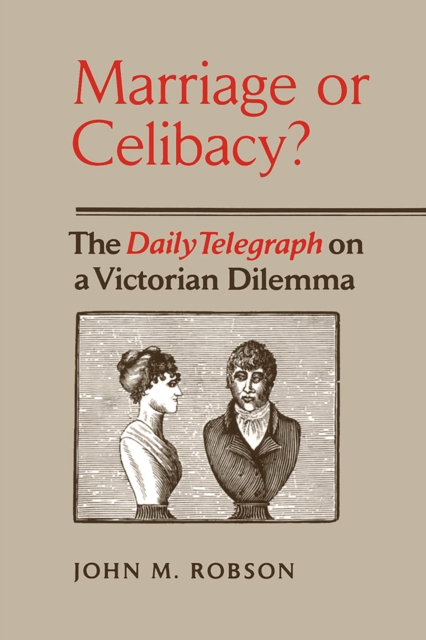
Marriage or Celibacy? : The Daily Telegraph on a Victorian Dilemma Paperback / softback
by John Robson
Paperback / softback
- Information
Description
In July 1868 the Daily Telegraph congratulated itself on providing the arena for a controversy marked by `good sense, liveliness, practical wisdom, and hearty humanity.' The controversy was over the choice -: 'Marriage or Celibacy?' - faced by middle-class youth trying to reconcile economic facts with moral values, social customs - and love.
The arena was the correspondence page of a newspaper just establishing itself as the most successful London daily through its appeal to the middle-class reader. Public attention was first caught by a court report of a failed attempt to entrap a Belgian girl into prostitution.
This induced blistering editorial comment and angry letters to the paper deploring ineffectual controls over the 'Great Social Evil.' The next development was unusual for the Victorian press: readers began to write extensive and richly varied comment on the root of the problem - young people did not have in possession or expectation enough money or the right qualifications for marriage.
The Telegraph initiated a new form of popular journalism by filling its correspondence columns for almost a month with readers' letters under the heading 'Marriage or Celibacy?', which they supplemented with lengthy leading articles. John Robson places in contemporary context the central issues facing Victorian youth: What is a proper marriage?
How to balance income and expenditure? What are the ideal qualities of young women and men? 'Emigration or starvation?' In examining these debates, he looks closely into methods of argument, connecting rhetorical techniques with public persuasion.
The letters being a special kind of discourse, he shows how in the debates rhetorical and logical arguments are specifically designed to persuade the Telegraph's readers. Marriage or Celibacy? contributes to our knowledge of Victorian manners and mores, particularly among the lower middle-class, and is a telling episode to the history of popular journalism.
Information
-
Available to Order - This title is available to order, with delivery expected within 2 weeks
- Format:Paperback / softback
- Pages:366 pages
- Publisher:University of Toronto Press
- Publication Date:19/04/1995
- Category:
- ISBN:9780802077981
Other Formats
- PDF from £39.10
Information
-
Available to Order - This title is available to order, with delivery expected within 2 weeks
- Format:Paperback / softback
- Pages:366 pages
- Publisher:University of Toronto Press
- Publication Date:19/04/1995
- Category:
- ISBN:9780802077981